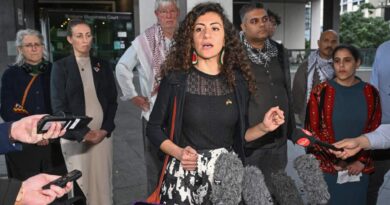Politicians and humanitarian advocates have renewed the push for the Australian government to repatriate an Australian man detained in Syria without charge.
Western Sydney schoolboy to live under the self-proclaimed Islamic State (IS) group in 2015.
At age 15, he was separated from his mother and detained without charge in one of Syria’s prisons, alongside IS fighters.
His brothers and other family members were killed fighting for the caliphate.
Despite once on Al-Hasakah prison, where he was being held at the time, his family was shown a proof of life video by Australian authorities in 2023.
, is now using her platform to push for other Australians detained abroad — including Zahab.
She too thought he had died in the 2022 airstrike, telling SBS News “at the time I was utterly horrified”.
News of his survival and continued incarceration in a Syrian prison “affected her deeply”.
“I think the government has a moral duty to help Yusuf, and to help the other — in particular underage children — who are Australian citizens,” she said. “These children are not culpable for the alleged crimes of their parents or their older siblings.”
Dateline tracked Zahab to an undisclosed military location in Syria’s northeast, where the Kurdish authorities allowed an interview.
“I just want to go back home,” he said in February.
“I wish to go back to Australia. I wish to go back to my normal life I used to live 10 years ago. I wish to see my family again.”
Now, Zahab is appealing to the Australian government to help him return home — and he’s not alone.
In his interview with Dateline, Zahab blamed his older brothers, Mohammed and Kaled, for his situation.
For Moore-Gilbert, reflecting upon the government response to her detainment in Iran and what Zahab is facing in Syria, said the “resource allocation” and “political attention” was completely different.
“These children are owed the same assistance that I received, and the same recognition,” she said.
Greens NSW senator David Shoebridge told SBS News the government is “refusing to confront the reality” of innocent women and children in Syria who have no way home.
“What is the government’s proposal for these Australian citizens who came to this terrible situation through no choice of their own, effectively trafficked into this appalling situation and now finding themselves … in indefinite detention?” he said.
A child looks on while standing at the al-Hol camp in Syria’s northeastern Al-Hasakah Governorate in October last year. Source: Getty / Delil Souleiman/AFP
Government ‘refusing to accept’ obligation
Shoebridge also cast doubt on the common refrain that it is too dangerous to send Australian politicians, consular staff or other government agency workers into Syria to extract and repatriate the estimated 42 Australians still in detention.
“We’ve had journalists enter these camps … it shouldn’t be outside the capability of the Australian government to also have contact,” he said. “This is an obligation that the government seems to be refusing to accept”.
There are approximately 14 prisons in the regions that contain some 2,000 foreign prisoners from 58 countries, according to a 2023 report by US think tank RAND Corporation.
Other countries like Canada have been criticised for leaving their citizens, including the children of so-called ISIS brides, in Syrian detention camps.
Canadian Prime Minister Justin Trudeau had also declared that it isn’t “safe” to send anyone into the camps [to help repatriate people], despite public backlash and lawsuits urging the government to act. Canada has slowly started the process of repatriation in recent years.
Shoebridge believes the Australian government should liaise closely with the Australian Security Intelligence Organisation (ASIO) and the Kurdish-run autonomous region’s officials to bring home “as many as they can”.
‘Uncomfortable political business’
Nathan Smyth of the Department of Home Affairs leads the group responsible for domestic and international engagement on national security. He said last week Home Affairs was “aware” of Zahab being incarcerated in Syria, but Australia does not “have staff or DFAT support on the ground” and have no “diplomatic relationship with the government of Syria”.
On Wednesday, a spokesperson at the Department of Foreign Affairs and Trade confirmed the government was providing consular assistance to the family of an Australian man currently detained in Syria.
“Our ability to provide consular assistance to Australians in Syria is severely limited due to the extremely dangerous security situation. Smartraveller travel advice for Syria is Do Not Travel,” the spokesperson said.
“Owing to privacy considerations, we are unable to provide further comment.”
Moore-Gilbert said the safety of consular staff was “paramount” but pointed out that Dateline was able to access Zahab.
“We’ve done it before, we can do it now,” she said.
In October 2022, the Australian government four women and their 13 children from detention camps in north-east Syria, following the repatriation of 18 orphaned minors in 2019.
At least 34 Australians are believed to remain there, according to Save the Children Australia.
Zahab told Dateline the only contact he’s had with Australian authorities was with the domestic spy agency.
ASIO director-general Mike Burgess said last month he was “relieved” that Zahab was “actually alive.”
“Obviously not everyone stuck in Syria is a threat to security,” he said. “It’s an unfortunate situation. Some are though and we have to be vigilant about that.”
Burgess said he would not comment on individual cases, or ASIO’s assessment of whether or not Zahab is considered a security threat, but did acknowledge “he’s obviously trapped in a terrible place and that’s horrible”.
The issue of repatriating Australians who are linked to IS is “uncomfortable political business,” Shoebridge said, adding that many politicians are hoping “this would all go away”.
“We’re talking about people’s lives … we’re talking about kids who have spent years in prison, women who are desperate just trying to keep their family safe,” he said. “It’s hard. But politicians can’t keep running away from it.”
Watch the two-part Dateline






